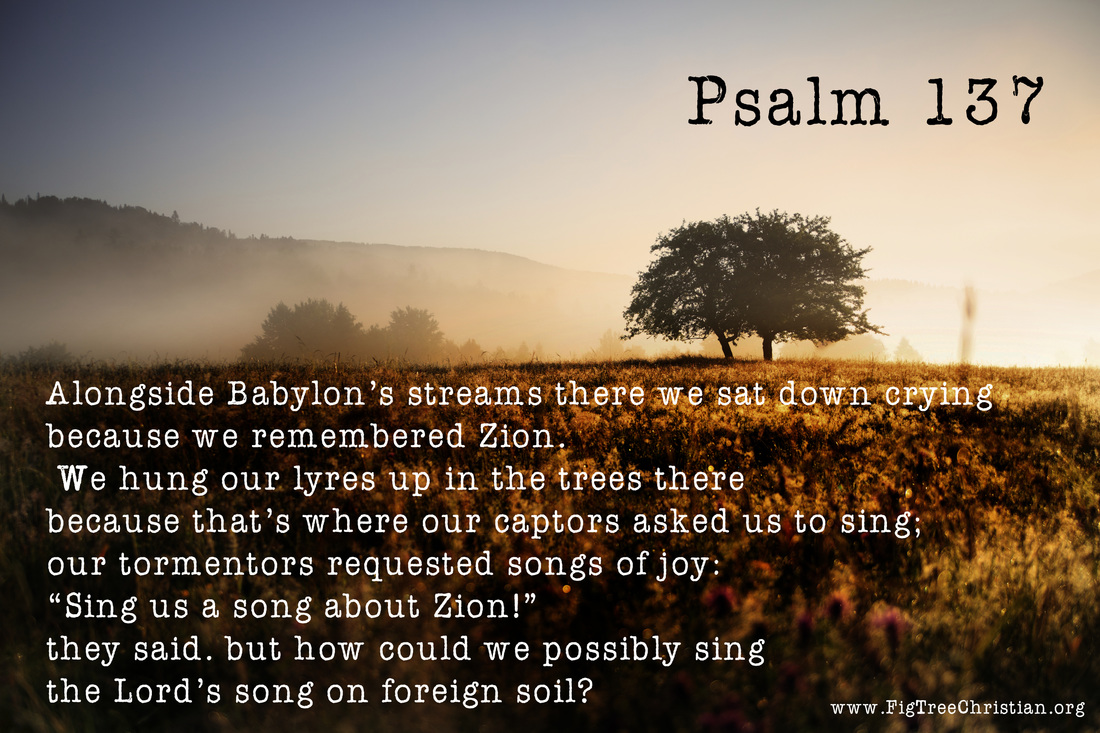-Rev Melissa Fain- Many ministers probably wouldn't say Psalm 137 is their favorite. I would go one step further and say most ministers wouldn't put this Psalm in their top ten list. It is uncomfortable. It is vengeful. It is because of both of these reasons I am drawn to look at it with closer inspection. Yeah, I could focus on Psalm 23 where God is our Divine Shepherd. I could joyously celebrate with a Psalm 94 or 100. Maybe in the future I will. Today is a day of reflection and acceptance. Reflection because difficult passages cannot be understood and embraced without introspection and a clear head. Acceptance because even in this difficult Psalm there is room to accept what the Psalmist is trying to say. The difficulty flows throughout this Psalm but the most difficult part happens at the end: "A blessing on the one who seizes your children and smashes them against the rock!" Yeah, it's in the bible. Like I said before, it is not comfortable and it is extremely vengeful. Could God allow such language? Do we have space in our understanding of God to live in this Psalm and believe it? I think the answer is yes, and here is why: God gives us space to work through our emotions. Don't take that sentence lightly. There are quiet a few theologies out there that don't believe it. There are ministers that will openly and easily preach about sin coming from thought. There are people who will suggest a person must think pure thoughts all the time. Thinking pure thoughts all the time is difficult when one is dealing with loss. You do not have to be a psychiatrist or a therapist to know there are stages to grief. Denial- anger- bargaining- depression- acceptance. No matter who you are or what your loss is, these stages happen in this order. They all hit people differently and the timing is different for each person, but this is the order. Acceptance can only happen once a person has dealt with the denial, anger, bargaining, and depression. Psalm 137 is a Psalm about the Israelite people dealing with the anger of loss. God doesn't want the Babylonian babies to be killed. That is not what this Psalm is about. The Israelites are not punished for wishing such harsh treatment on the people of Babylon. Instead, we see the people are allowed to speak and work through their emotions. In my mind, that transforms this Psalm from disturbing to sadly beautiful. Psalm 137 remains in the book to remind us God is not after perfect thought, but thought that leads our fragmented selves to wholeness. We are given space to go through the stages of grief to reach acceptance, and ultimately wholeness. This meditation was first written on 11/13/2012. It was updated and republished on 8/11/2016.
Wanna connect with others? Join Fig Tree on: Facebook (We live cast the event every Saturday at 2pm EST, for those who wish to participate. Come to the actual event the first Saturday of the month at FCC Marietta.) Our Subreddit |
Categories
All
Archives
October 2023
|




 RSS Feed
RSS Feed